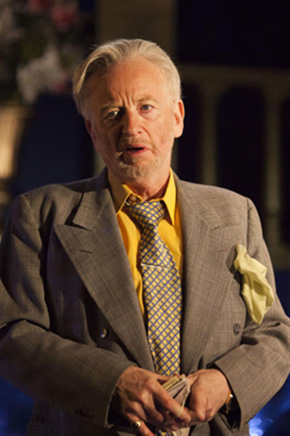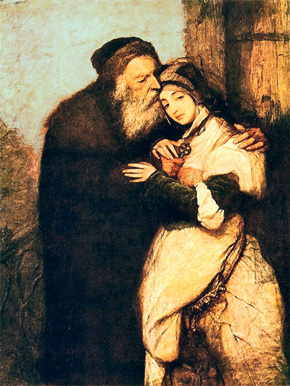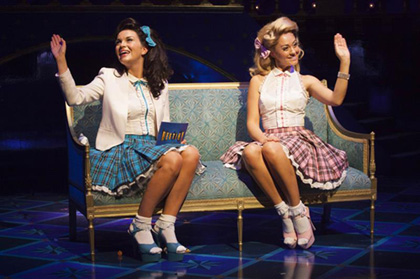Quality of mercy strain’d
by Mika Provata-CarloneThe Merchant of Venice is one of the most poignantly tragic, most unassailably human literary works ever created. If it were to be lost or disappear, much of what makes life worth living would be lost with it. It vitally seeks to express what makes human existence and human society possible – and to expose what undermines and destroys it. The play is called a comedy, and it is such in the sense that Dante’s Divina Commedia is a comedy: a compendium of human instances and experience, flamboyantly or breathtakingly magnified and sharpened so as to lead us to a brilliant recognition of our own all too frequent grotesqueness and stupidity, but also of our own all too simple yearning for hope and redemption. It is a comedy true to the tradition of Ancient Greek theatre: the Janus face of the piercingly wise, cathartically relentless tragedies, equally perceptive but with a seemingly more indulgent measure of the common man. The Merchant of Venice is a comedy in that in the end the torn strands and ragged ends of our humanity find understanding – in the mind of the spectator, if not in the mind of the play’s characters.
There are many strands whirled about by Venetian winds in Shakespeare’s play: there is, notoriously, the newish invention of modern economics dependent on interest-based lending as introduced by the Medici and creating international markets, new social classes, new money and especially new bankruptcies and novel poverty – spiritual as well as material. There is the theme of love and the good life – what makes it so, what makes it possible, attainable, worthwhile. There is the theme, often overlooked, of the place of women in a fast-growing, ever-changing, ambitious man’s world. Who holds the reins? Where is the balance, if any? Time will tell, or Will will tell at the end of his play. Above all there is the theme of humanity, common, shared, vital humanity: the I and Thou of Martin Buber and Jewish philosophy and ethics, and the principle of love of Christian ethos and credo. This is the crux of the play, and every single character on this Shakespearean stage is weighed on that scale. Too often, we find the play’s truth too difficult, too close to home, and seek to slither through the demands it makes of our conscience by means of stereotypes: Christian versus Jew, rich man versus poor man, civilised European nobleman versus barbarian Moroccan king. We grasp at words and fail to see their meaning: that famous infamous pound of flesh, for example.
A modern adaptation must be resonant with all the old echoes and stand by, not against, its text of inspiration. In this case, the reinvention has very little true innovation at its heart, only random, impetuous improvisation.”
Why does Shylock ask for a pound of flesh? Surely, were he the villain most critics see him to be, money would be the thing, the tool and spirit of his revenge, the spring of his trap. Money and social degradation, understood in purely material, quantifiable, ‘tangible’ terms. Yet Shakespeare is not Marlowe, for all that they were exact contemporaries, and his Shylock is no crude Maltese Barnabas. Shylock is the ultimate tragic character, the supreme exile both from human society and from himself, including his own faith. The pound of flesh that he demands is not Antonio’s but his own. And the one who fails to value (as opposed to putting a price to) the “quality of mercy” is not Shylock, but the same Antonio. When Shylock has Antonio at his mercantile mercy, he offers to him an interest-free loan – accompanied by an unflinching reminder of Antonio’s anti-Semitic attacks and hate-campaign against him.

Ian McDiarmid as Shylock in the Almeida production of The Merchant of Venice, relocated to Las Vegas © Ellie Kurttz
Antonio is surprised – but does not understand. He thinks he got something (a lot in fact) for nothing. That nothing is Shylock himself: by asking for a pound of flesh, he pleads with unique dignity for a pound of validated human existence in Antonio’s eyes. For a pound of flesh-and-blood belonging to Venetian society – the society that coined the term and the place of the ghetto, from the Venetian dialect word ‘ghet’ meaning waste, rubbish, refuse, the French ‘guetter’, meaning keeping a policing eye on, ‘get’, the Hebrew word for a divorce or separation document, or the Italian ‘borghetto’, an urban district, in this case of confinement – the etymology is inscrutable but always sinisterly suggestive.
It is the kind and Christian Antonio who first refuses Christian mercy – and will be taught to value it dearly through Portia’s truly wise and most learned speech at the trial scene. It is the Jew Shylock who first offers the love of thy neighbour of his own Leviticus. And yet in the play both Shylock and Antonio fail in the end – so that perhaps we, the audience, may learn from what they failed to grasp and perceive. Antonio becomes immured in his bigotry, remains a lonely, isolated, rich man at the end of the play. A lost, vindicated, errant soul. And Shylock? Shylock loses all, not because Shakespeare wants to beat him harder, but because he wants him to personify the tragic predicament of all existence. Shylock tries to choose the casket of lead: “Who chooseth me must give and hazard all he hath,” says the inscription, and Shylock does hazard and give all. Fate, in Shakespeare’s hands, takes all and leaves Shylock with nothing: his loan is gone, his daughter lost, his faith in the return of humanity given, which ought to form the basis of his Jewish soul, utterly shaken. The man who seeks the trial of Antonio and cruelly reasoned revenge is no longer Shylock but a frail, lonely humanity driven to tragic, devastating despair by a total denial of existence. If anything, Shylock is a counterfoil to Medea, driven mad, inhuman, bloody by the cruelty of those he/she tried so much to love. The end of Shakespeare’s play is not a conclusion but an open question, a resounding “J’accuse”.
All this is lost, ravaged and brutally travestied in Rupert Goold’s production of The Merchant of Venice currently at the Almeida. An explicitly graphic adaptation of the play, this show has little direction or insight to offer, for all its extravagance and dare-devil forays into the most startling associations. The two main characters, Antonio and Shylock, played by the outstanding Scott Handy and Ian McDiarmid respectively, seem lost and out of place – and in an eerie way this makes their speeches staggeringly articulate and striking. Two solitary suited gentlemen in a sea of celebrity-show flotsam and jetsam, popular culture lookalikes and facilely clever social referencing. A modern Venetian carnival where anything goes. But this purported contrast between an almost ghostly grey reality and the virtual, bling, consumerist, hallucinatory modernity we have staged around us does not succeed in shocking us into an understanding of the meaning of Shakespeare’s play. It merely dumbfounds us, dazes us, forces us to laugh nervously. The trivialisation of the historical echoes and aftershocks of the readings and misreadings of the play is the only shock, such as the yellow-star-of-David yellow of Ian McDiarmid’s shirt. Here, as everywhere, the noise of the rest of the production, senseless, raging, disorienting, causes erasure rather than marking a stark allusion, in this case to the horrific and perverse use of Shylock in Nazi ideology.
The transposition of older texts onto new contexts can be the most fruitful act of re-creation, provided that it seeks to understand, respect, offer generously what was originally given. The need to retell must come from the excitement of all that the original story has told already, and not from a doubt that it can no longer speak or from the presumption that one can tell it better. A modern adaptation must be resonant with all the old echoes and stand by, not against, its text of inspiration. In this case, the reinvention has very little true innovation at its heart, only random, impetuous improvisation. The overcrowded barrenness of this production is certainly a great pity because a modern adaptation of The Merchant of Venice would have been a sheer tour de force, a chance to speak strong as well as gentle words of pure gold to souls tired of counterfeit currencies.
Mika Provata-Carlone is an independent scholar, translator, editor and illustrator, and a contributing editor to Bookanista. She has a doctorate from Princeton University and lives and works in London.
The Merchant of Venice continues at the Almeida to 14 February. Read more.



